It was supposed to be magazines.
Elaine Wooton contacted me as many people do – in the middle of a shutdown and discard project, asking if the Internet Archive might want some of what is destined for deep storage or the trash compactor. In this case, she said, there might be some old journals and magazines I’d want. They were centered around the culture and innovations of the modern office, “modern” being the 1970s and 1980s. My general policy is to say yes, and if possible, make my way down to get the materials themselves. This set was in New York City, and as I live outside the metropolis, I said I’d be glad to pop down from my home and pick up these 5-10 banker’s boxes worth, to make it easier.
Elaine brought out the boxes on a cart, and said that if at all possible, I might consider coming upstairs to the office she was cleaning out to see if anything else might be of interest.
I parked my car and came up.
This is what I saw.
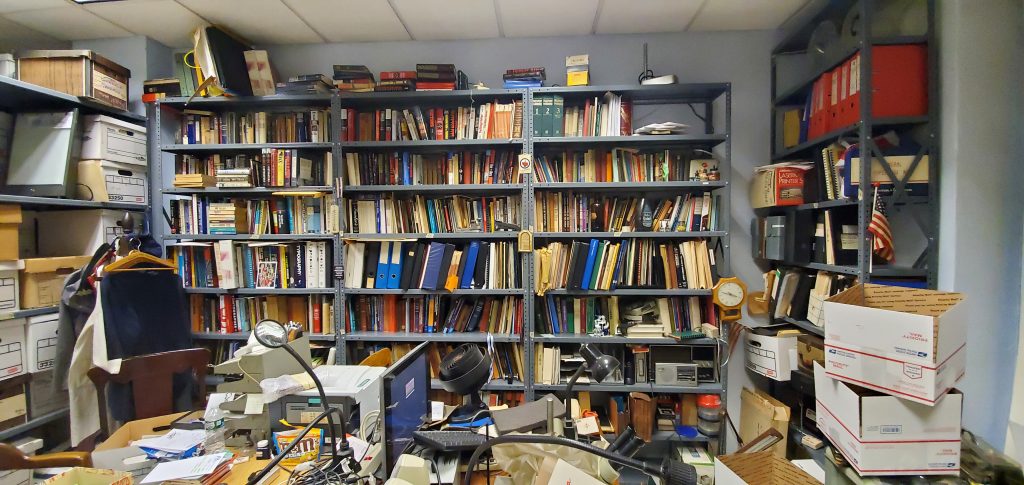
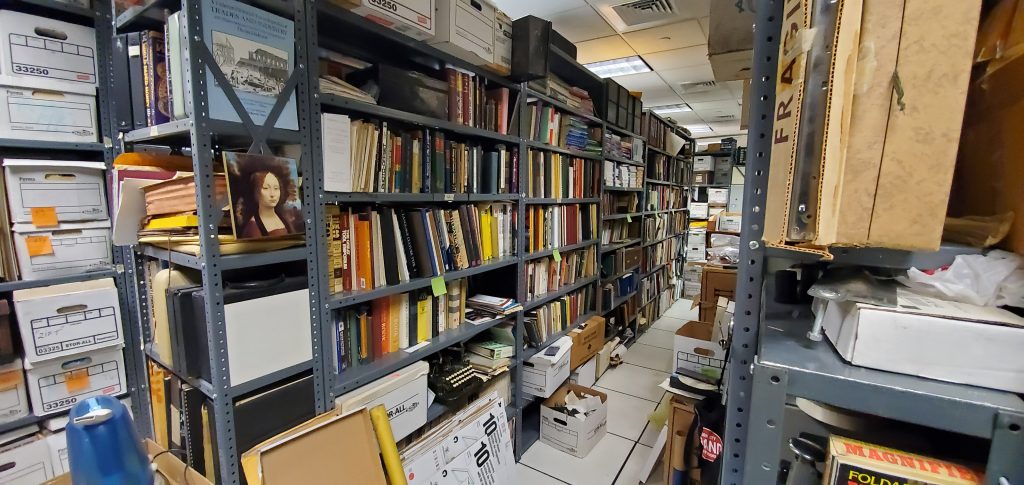
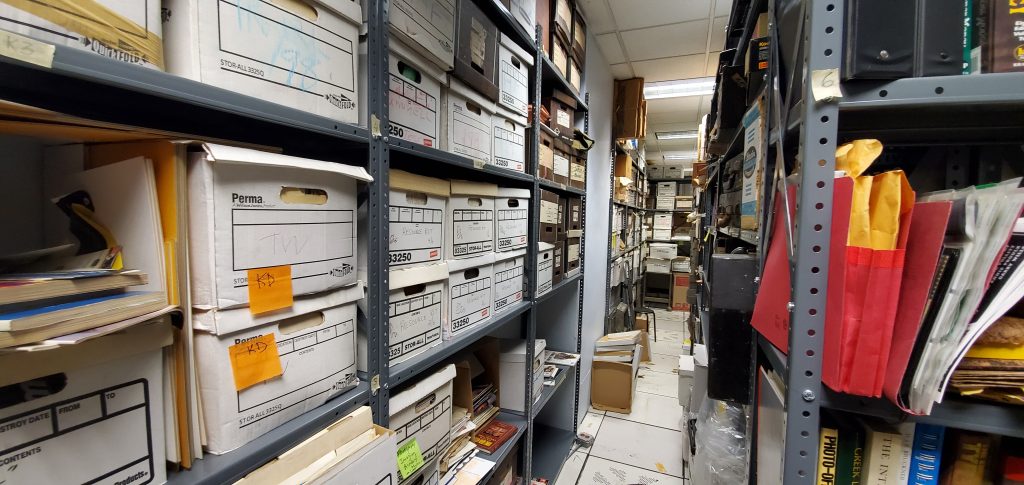
I asked a few questions about the nature and story of this office, and based on those answers, I said something that I honestly don’t get a chance to say that often:
“We will take all of it.”
A month later, nearly the entire contents of this office and storage were here:
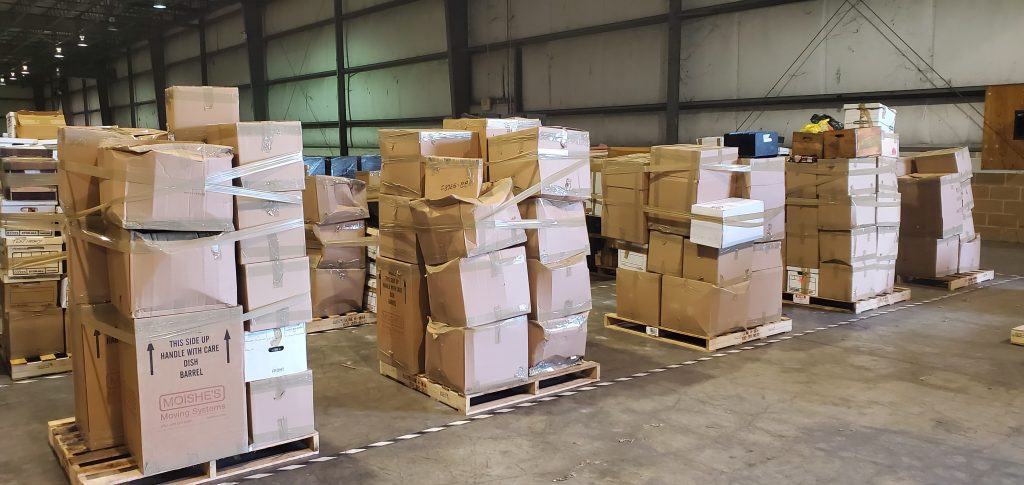
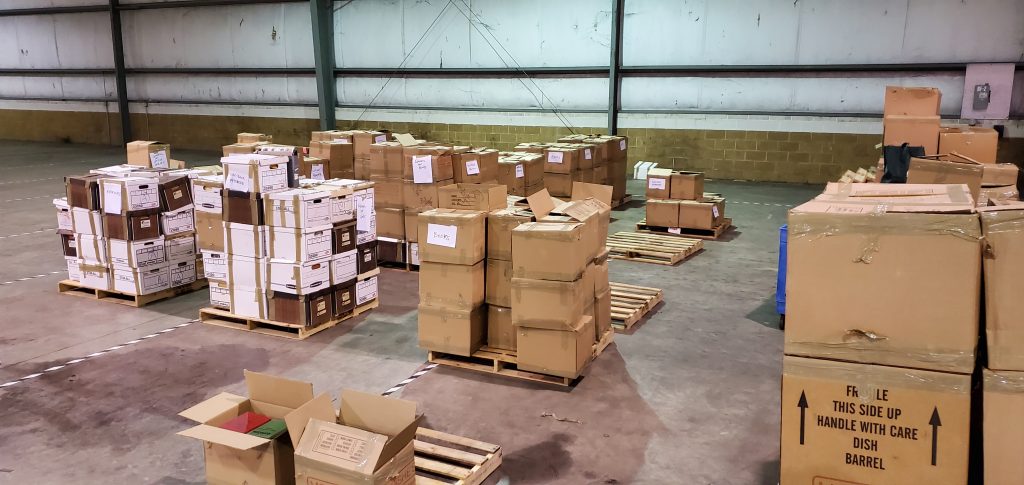
As our team of folks began remixing the collection of boxes from the quick job done by movers into something more manageable for the Archive, Elaine and I were standing at the final chapter of a family history that spanned many decades and represented both a disappearing world and a fascinating story.
“Psychoanalysis for your typewriter“
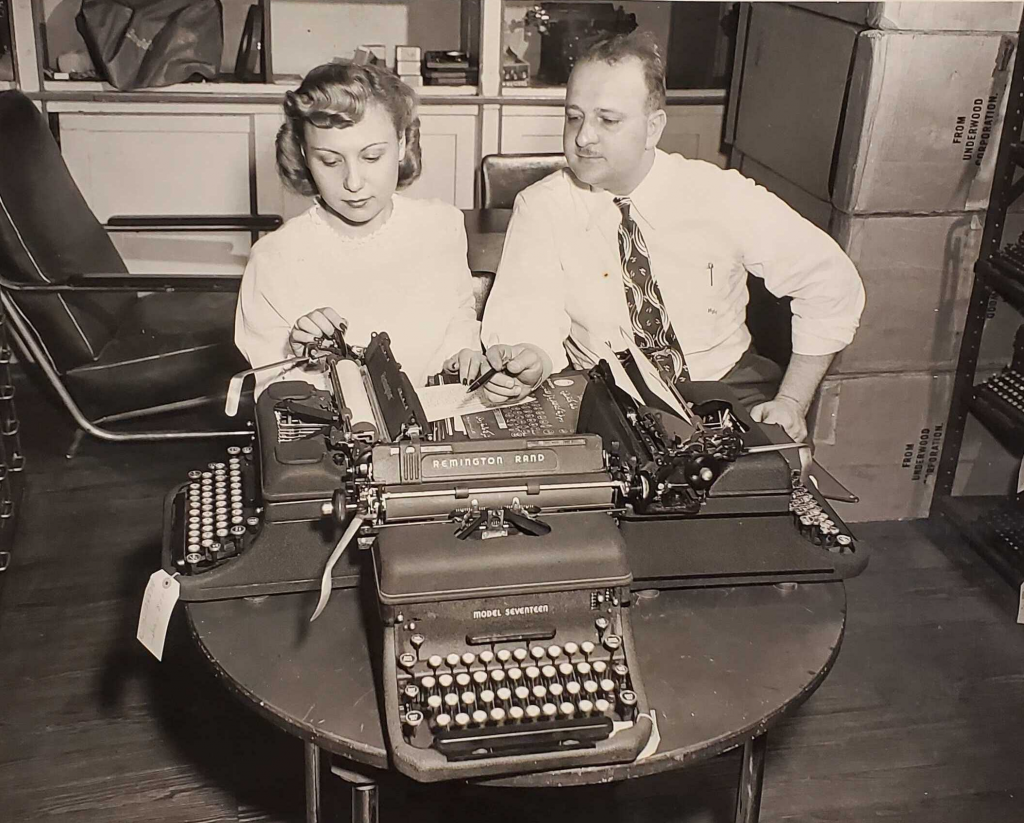
Imagine being so well-known for your craft that letters addressed to “Mr. Typewriter, New York” would get delivered by the Post Office to your door. Imagine you mount a letter wrong while crafting a typewriter, and it causes a country (Burma) to change that letter to accommodate your mistake. Or that, through decades, your expert testimony about the accuracy of a brand of typewriter and the characters it types means the difference between guilt, incarceration, freedom or the swapping of fortunes. Such was the life of Pearl and Martin Tytell, of Tytell Typewriter. From a shop on Fulton Street of NYC from 1938 to 2000, the couple oversaw not just endless consultations and repairs, but fabrications and projects that were revolutions in themselves. Hanging from a wall near Martin and his bowtie and lab coat was a sign reading “Psychoanalysis For Your Typewriter.” Many people, famous and not, stood under that sign, hoping their machines could be repaired and tuned by this expert shop.
Besides the repair and care of typewriters, Pearl and Martin also had a thriving and critical business in forensic document analysis, or “Questioned Document Examination” as the discipline is known. When the typewriter business wound down, the Tytell’s son, Peter, became a giant in that field and continued it as his primary vocation. These examinations became critical for researchers, criminal investigations, and courtroom testimony.
It would be a true short-changing of the Tytell legacy for me to cobble together and leave these few paragraphs about the family’s accomplishments and outlook on life, as well as the part they played in the character of New York City. Luckily for all of us, the Tytell story was unique and attractive enough to get a huge amount of stories, especially in the 1990s and 2000s, written in magazines, newspapers and blogs. There was just something incredibly compelling about the discipline and activity the family engaged in.
A Door Closing, Another Opening
Elaine, a protégée of Peter Tytell’s, was overseeing the shutdown of the Forensic Research company this summer. Peter had pleural mesothelioma and was not expected to live for much longer, but he was using his remaining strength to give instructions where he could about the closure. Among the questions were the destination of the racks of material and various artifacts and equipment inside the building.
Elaine reached out to me primarily because of our working together on the 2015 Manuals Plus loadout, an ongoing project to maintain one of the larger paper manual collections in the world. She figured I might take a few extra parts of this considerable collection, while the rest would be split between another forensic group and put into deep storage. When I indicated the Archive would just take it all, this set things into motion in a different direction.
Ultimately, Peter saw it as a good fit and a proper destination, and gave his permission during the final month of cleanup. He died on August 11, a week before the trucks began transporting the boxes of materials away.
Mostly Internet, But Still An Archive
For people who mostly pay attention to the online experience of Internet Archive, it might come as a surprise that we maintain extensive physical materials, primarily printed. It might come as a greater surprise to know these items number in the millions and span many different mediums. A documentary called Recorder touches on the Marion Stokes collection we house, which are thousands of videotapes recorded over decades.
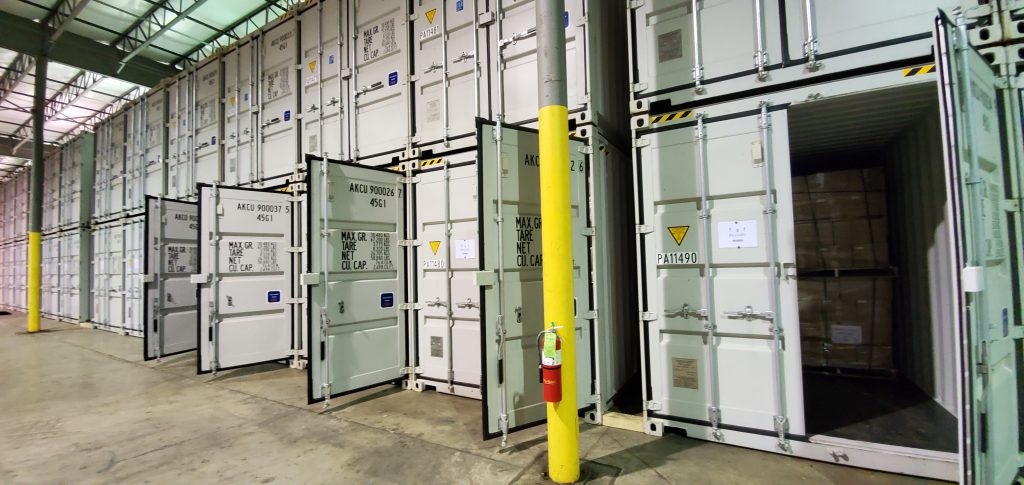
While some of the items in the Tytell Collection might be outside the realm of what we would normally acquire, it seemed right to just accept the entire set, as together it tells a stronger story than having parts of it discarded or stored elsewhere. This was, after all, a multi-generational family business and the already-whittled results of years of maintenance and caretaking by Peter Tytell; there didn’t seem to be a reason to arbitrarily cut it down further.
Two Days of Sorting
Upon arrival, the collection was mostly in large sets of arbitrary piles with some rough markings by the movers, as well as scrawled notes by Peter put there over the years. While some boxes might have seemed crushed, in fact it was because they were housing heavy typewriters, wrapped in bubble wrap, and had combined into a sort of gravity well of cardboard. They’re all fine.
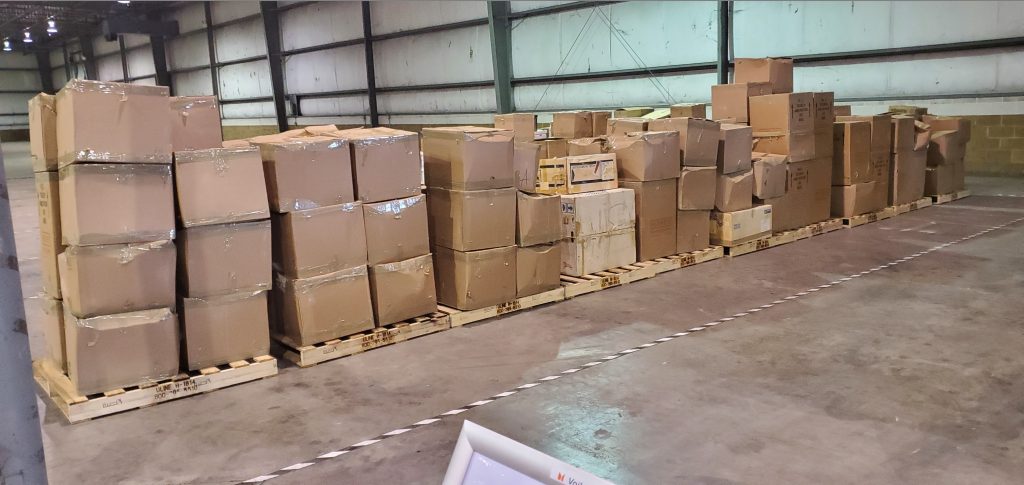
We spent two days inspecting all the boxes, and moving them into rough classifications: Books, Ephemera, Typewriters, Equipment, and so on. In doing so, we got a (very) initial assessment of the treasures within. Some notable examples:
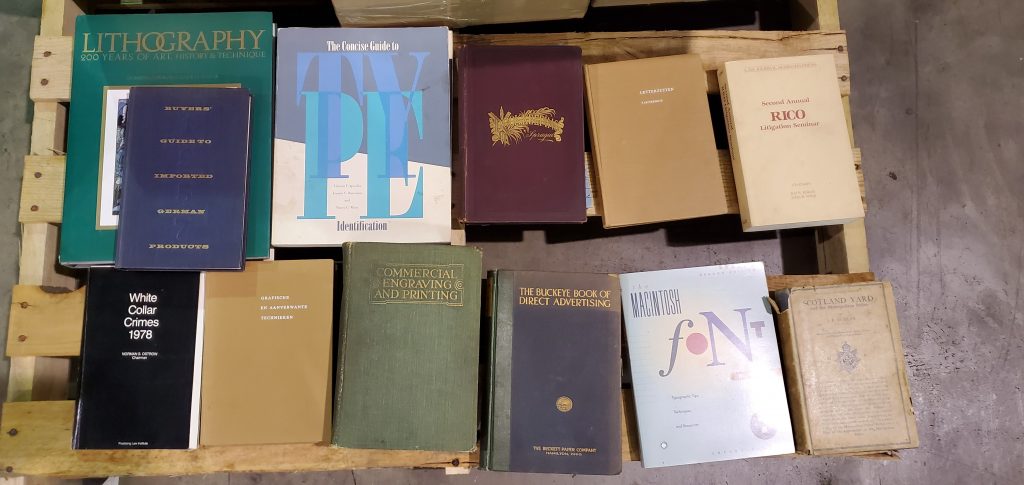
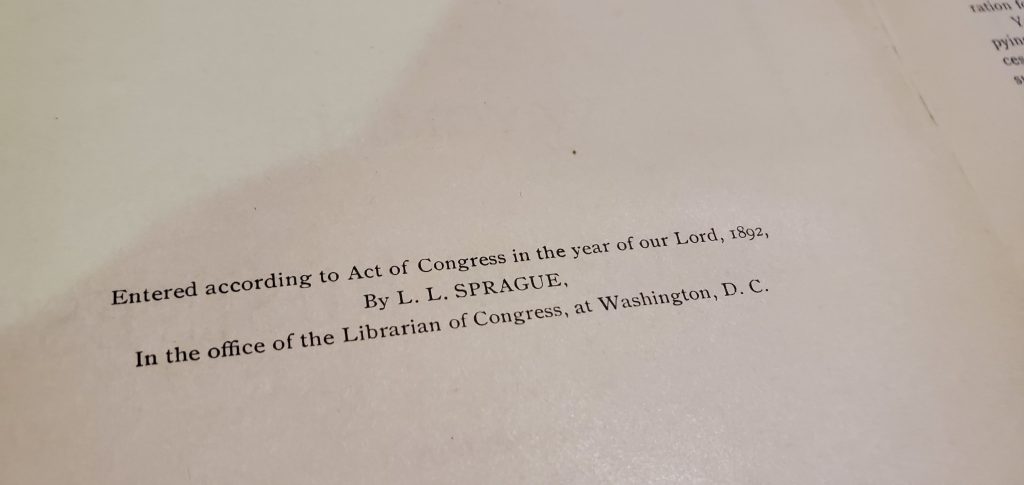
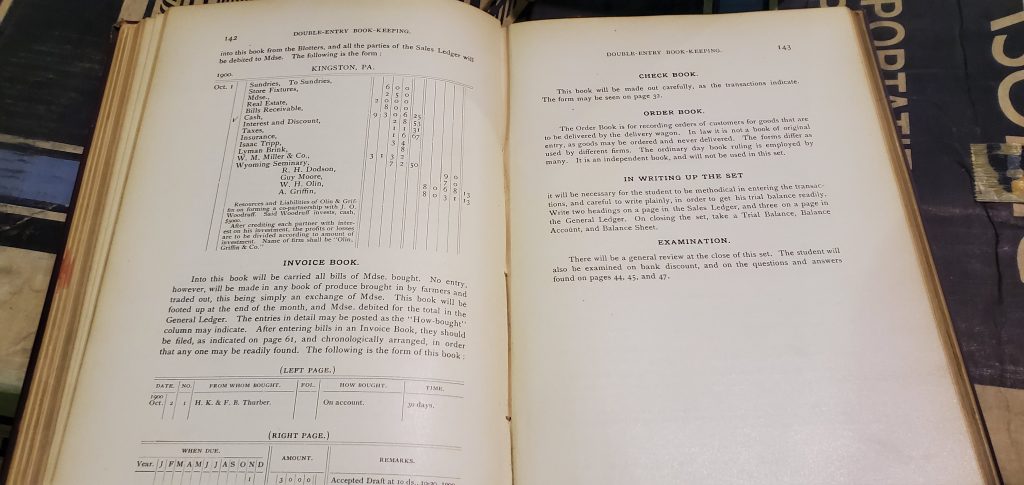
The subject matter of the hundreds of books in the collection range from criminal law (related to the investigative arm of the company) to graphology (study of handwriting) as well as overviews of law enforcement, detective work, and extensive guides of typewriter history. Some of these books are very old; an 1892 treatise on the ins and outs of bookkeeping was particularly beautiful.
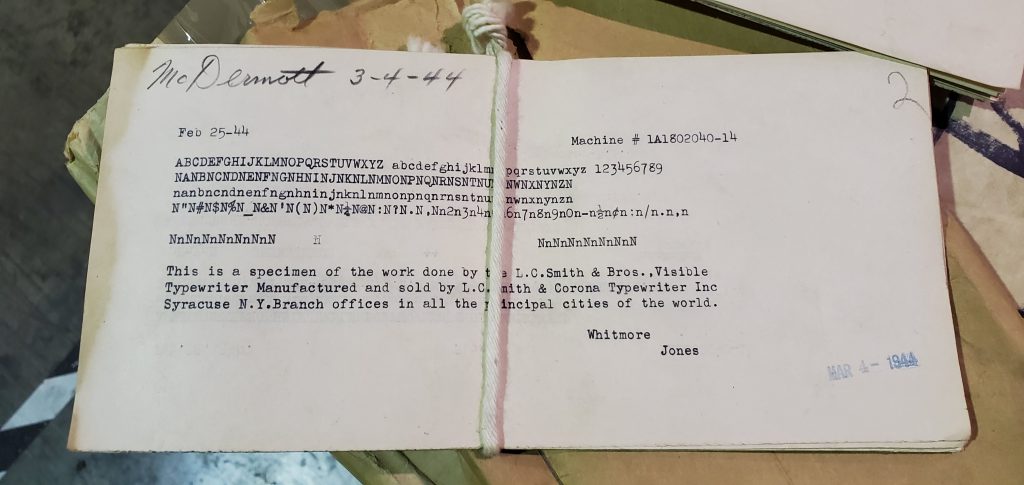
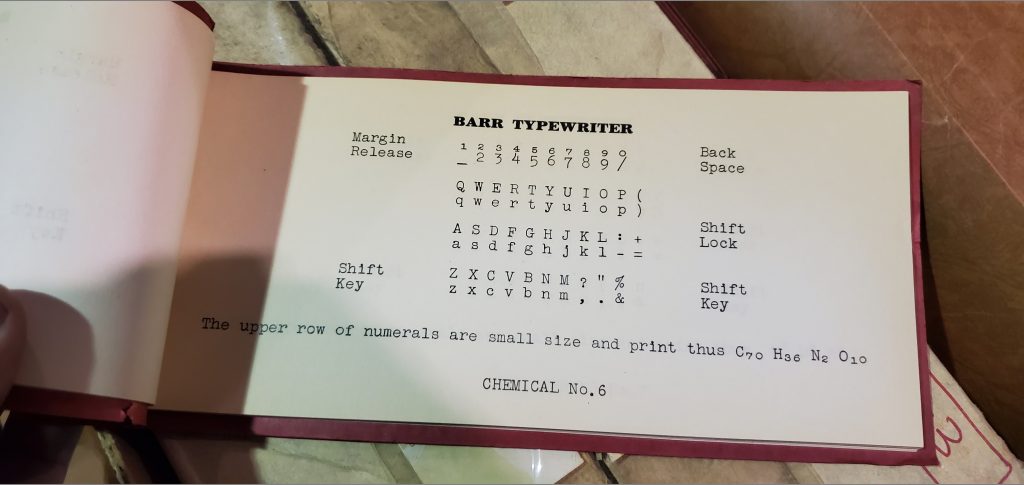
Hundreds of samples, both printed and hand-made, of typewriter output, separated by years, brands, and models. This may be one of the most important pieces of the collection, and one that will be digitized as soon as possible; they represent hard knowledge and evidence of what typewriters were capable of or what brands had which abilities at what time. These cards were used by the Tytells in court cases; research into what typewriters were capable of what featured in the Killian Documents Controversy.
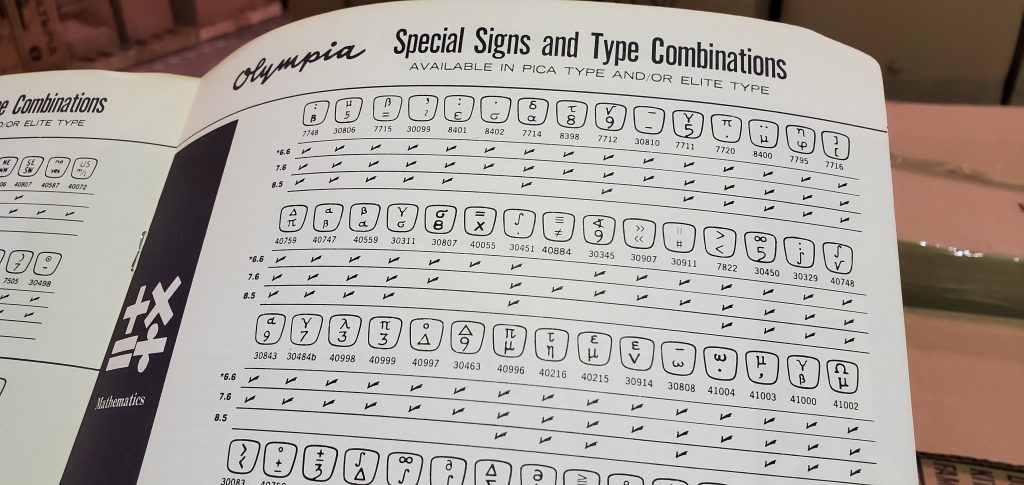
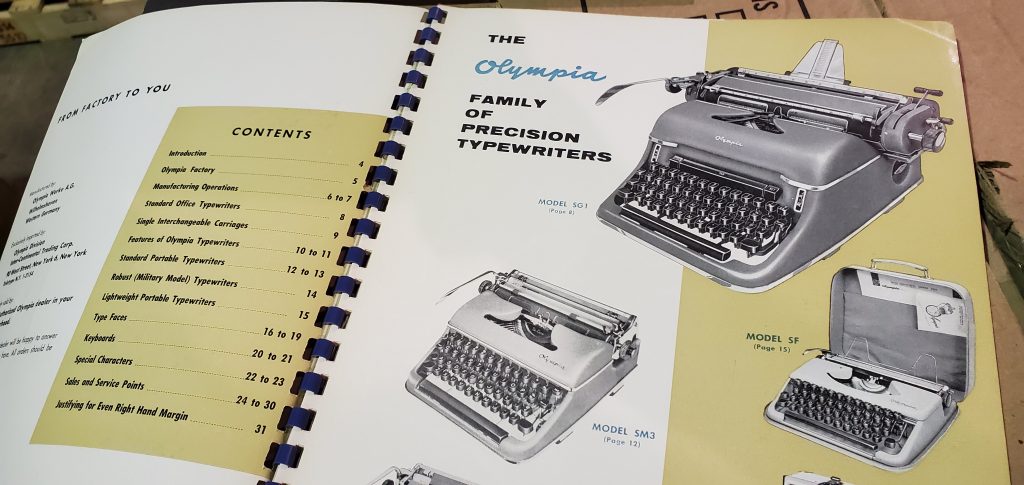
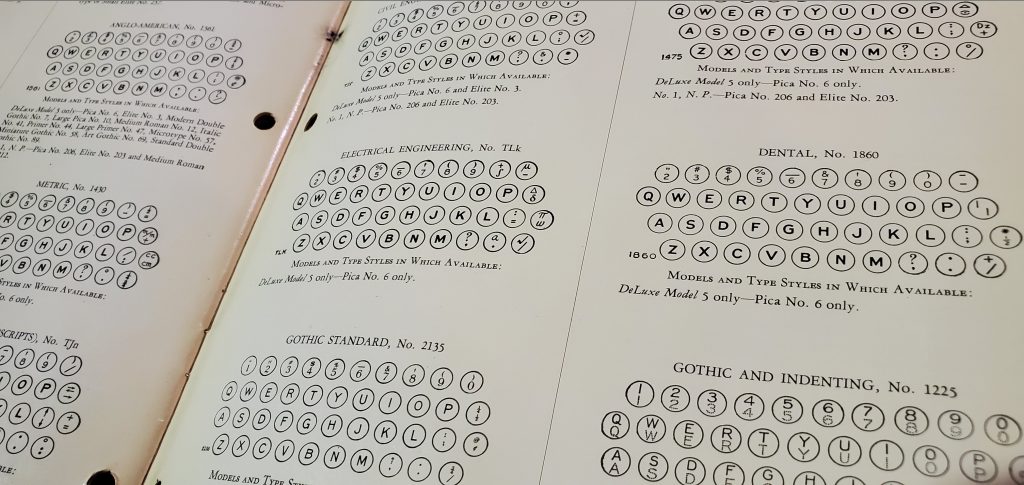
Brochures, stand-ups and manuals related to typewriter and print. There are thousands of pages of documents in this collection related to the sale, operation and overview of typewriters. They are incredibly well preserved and very beautiful, and digitizing them will be a chore but also a joy with what comes out the other end.
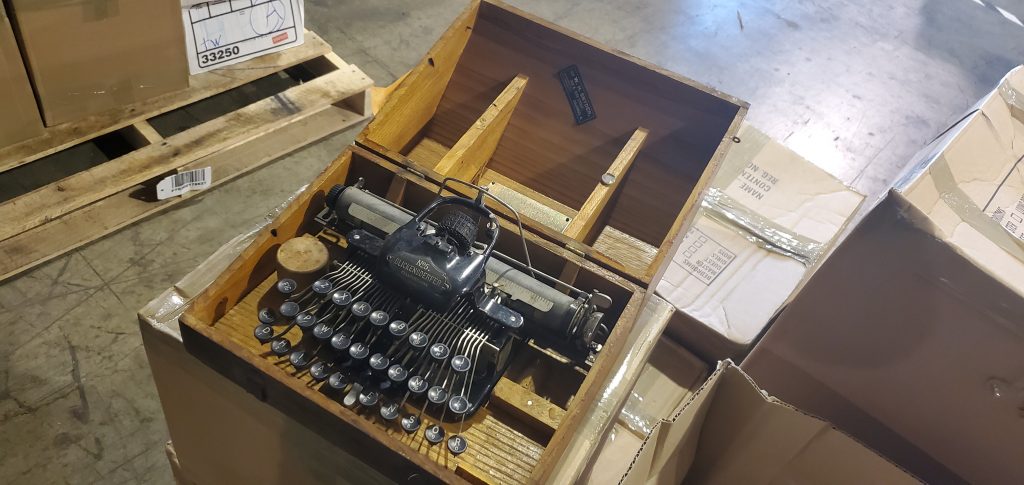
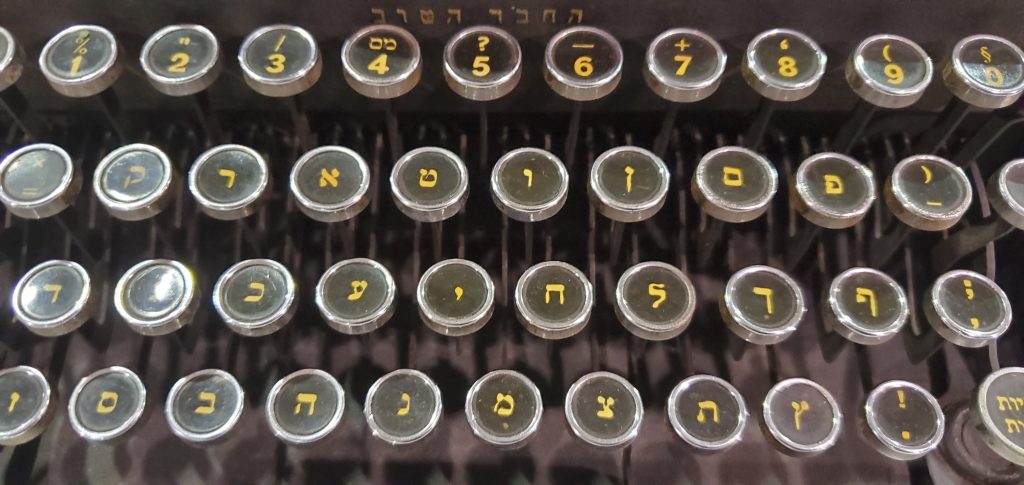
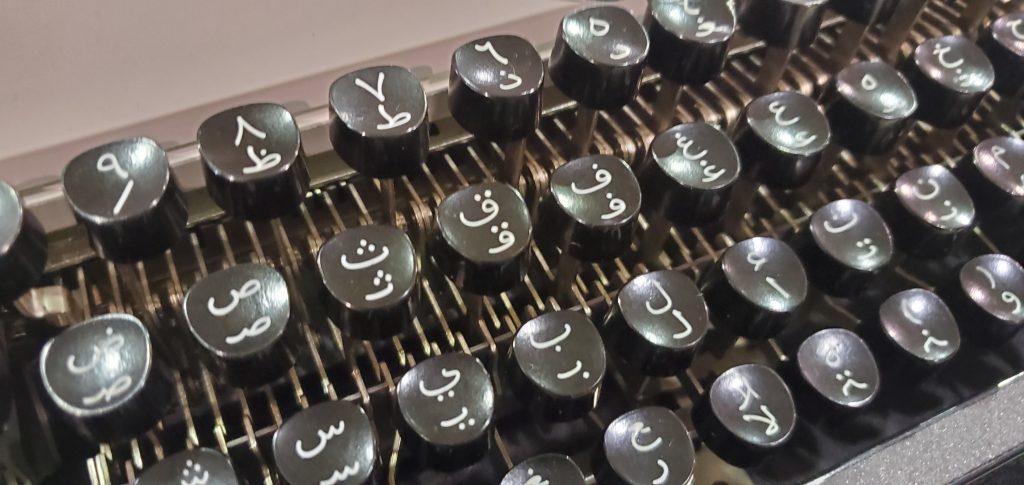
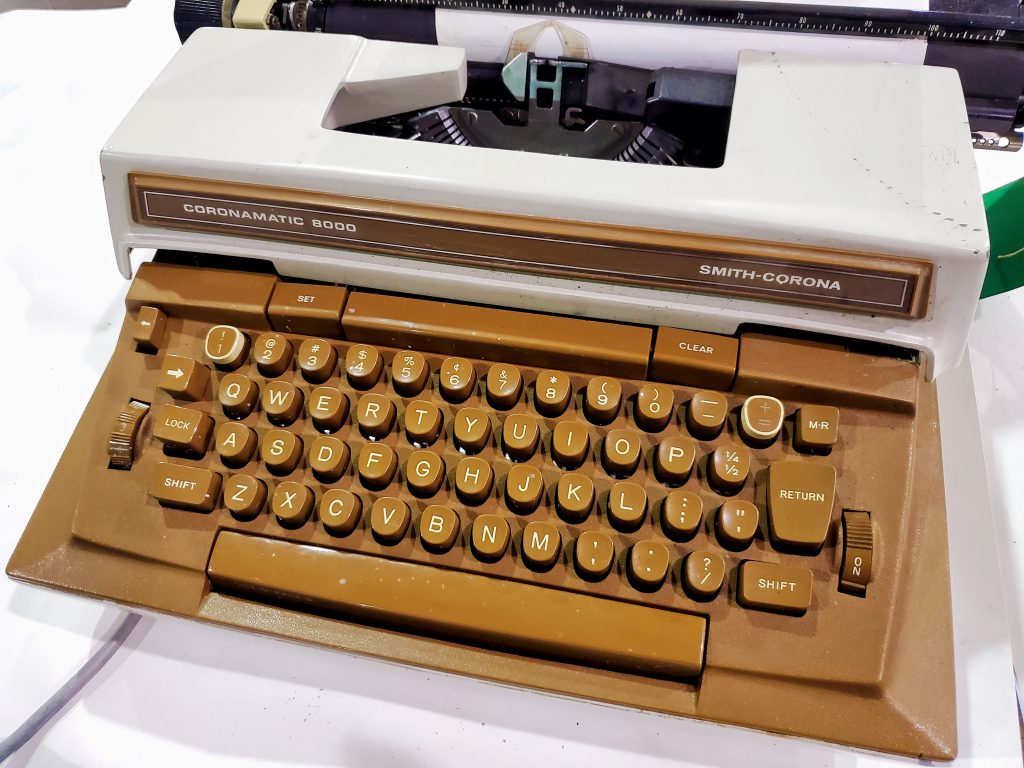
Typewriters of every description; standard commercial models now long out of production and sale, as well as custom or extremely-low production examples, such as machines that type in Arabic or Hebrew. They will not be stored away never to be seen again; they will, however it is worked out, play a part in telling the story of typewriters and the family that lovingly worked on them for so long.
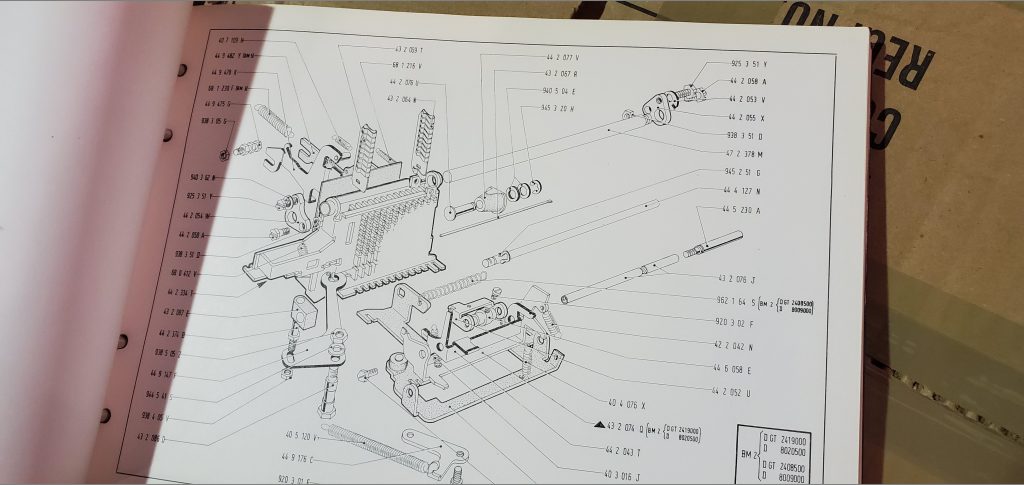
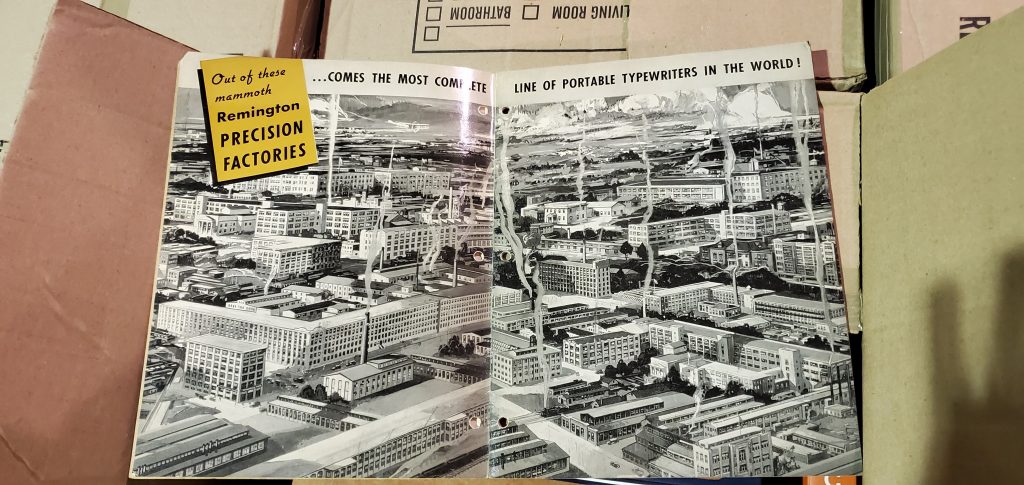
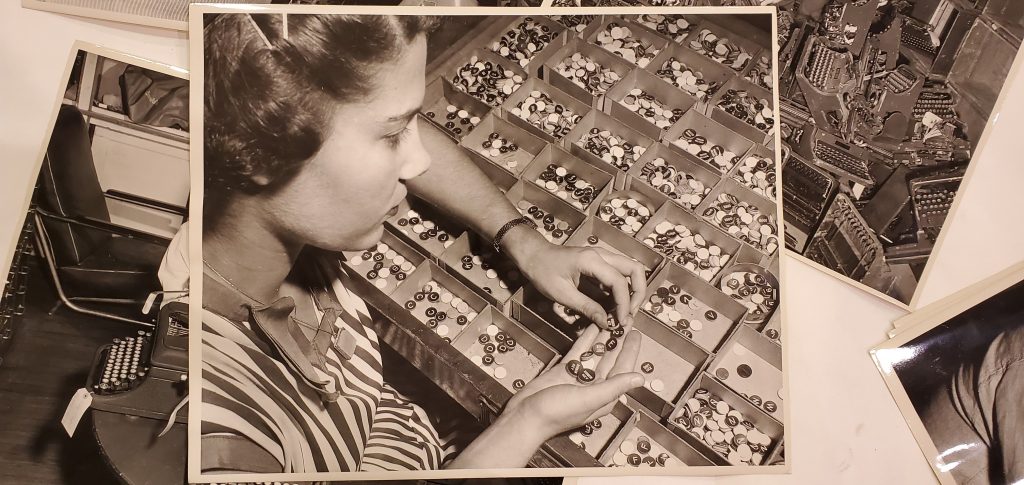
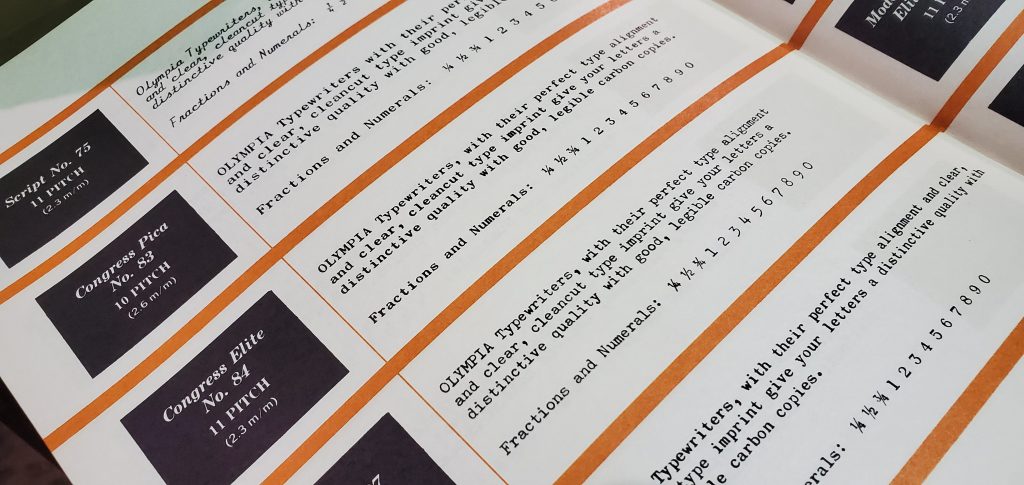
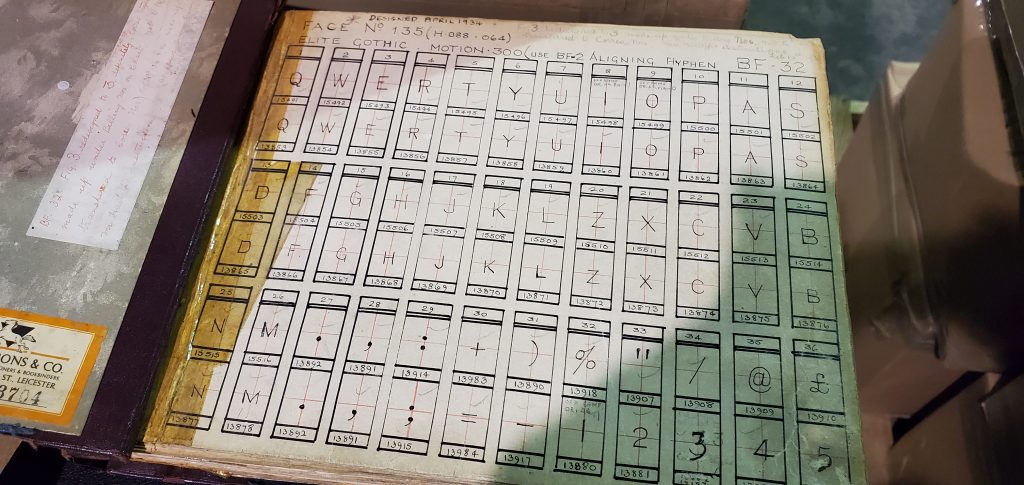
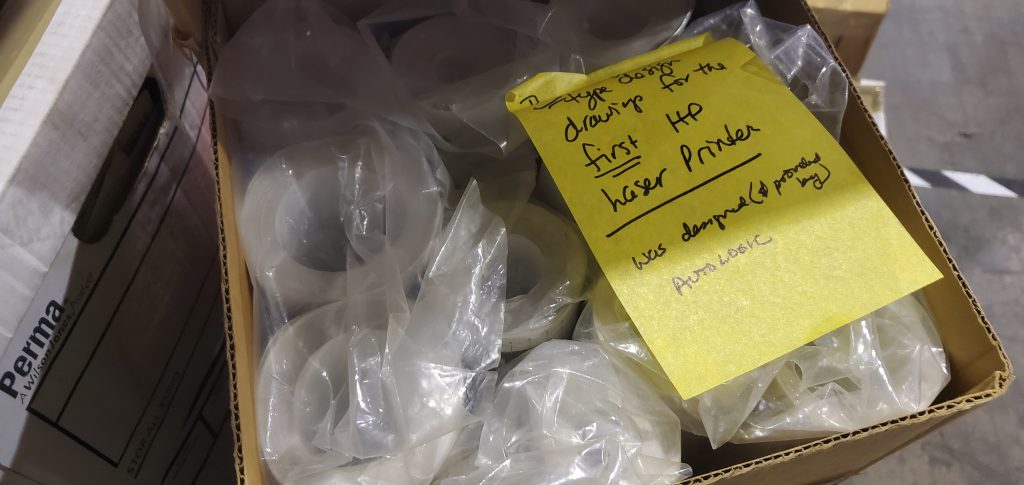
If the variation and size of this collection seems endless – that’s a natural reaction. In fact, it is exciting on many different levels, with all sorts of disciplines combining into pallets of boxes now sitting quietly in storage. That’s the magic of a acquisition like this; the character and nature of a family of experts breathes out from every container.
It’ll be an extensive project to process and understand everything here, and it’ll be an honor to play a part in its preservation. We mourn those who came before us and thank them, as we can, for the opportunity to keep telling their stories.
Further Reading of Tytell Typewriter Company and Peter, Martin and Pearl Tytell
https://www.theatlantic.com/magazine/archive/1997/11/typewriter-man/376988/
https://en.wikipedia.org/wiki/Martin_Tytell
https://www.irishtimes.com/business/no-carriage-return-for-the-jurassic-typewriter-1.304472
https://www.nytimes.com/1994/06/12/nyregion/new-yorkers-co-mr-typewriter-new-york.html
https://www.nytimes.com/2008/09/12/nyregion/12tytell.html
https://www.nytimes.com/2001/02/19/nyregion/one-fewer-place-to-unstick-a-inicky-f-key.html
http://algerhiss.com/history/the-hiss-case-the-1940s/the-typewriter/forgery-by-typewriter/forging-a-typewriter/
http://afflictor.com/2012/06/11/he-could-make-an-american-typewriter-speak-145-different-tongues-from-russian-to-homeric-greek/
https://www.nytimes.com/2017/11/24/obituaries/mary-adelman-89-fixer-of-broken-typewriters-is-dead.html
https://oztypewriter.blogspot.com/2020/08/a-tribute-to-peter-tytell-son-of.html
https://www.nytimes.com/2020/08/18/us/peter-v-tytell-dead.html
Thank you so much for preserving this priceless collection! I heard about it from Marcin Wichary, who I understand is already working with you to help sort and classify. Please let me (and others) know how to stay informed as progress develops. I’d gladly spend hours as a volunteer were I not the width of a continent away.
Wow… it’s incredible that you were able to get your hands on Peter Tyrell’s legacy of materials. Congratulations and I look forward to see the digitized versions of everything! Where/when will you display the typewriters? I’d love to make a trip and see them!
I add my thanks also, Jason. Peter was a dear friend and colleague and I know keeping this collection together and widely available through the archives was the best option possible. All of Peter’s friends and colleagues are surely appreciative of not only your efforts but those of Elaine who worked tirelessly to organize and preserve these items. They are obviously in caring hands and we are truly grateful.
You are doing what places like the Smithsonian or the Library of Congress cannot; catch an entire category as it falls off the edge of the world. This is what the Library at Alexandria was created for.
I am so grateful. Don’t stop.
Such a amazing post very informative and I will definitely suggest other people about it for sure.
Pingback: An Archive of a Different Type | Hacker News
Nice work.
You are doing a wonderful thing by taking care of this unique collection and sharing it with the world. Thank you.
What’s the story about Burma changing a letter to accommodate your mistake?
The story is in the first article link listed at the bottom (the atlantic).
I also want to know the story of Burma and the typewriter.
I am so happy that the Internet Archive exists. What other organization both accepts priceless collections such as this and then makes the collections available to the entire world for the benefit of society?
It is distressing to think that some of this collection could have been lost forever, were it not for the Internet Archive.
Thank you IA!
Thank you. Thank you. Thank you.
This is a wonderful article. I will let others know about this post. Archive is a really awesome site. I have benefited a lot from this.
As an Archive supporter, I am very pleased to see this connection to my departed friend, Peter. As one of his colleagues, I too visited his laboratory but at its old location on Fulton St., when he was downsizing in 2013 for a move. I drove back to Ottawa with a load of equipment and a memorable experience, one of many, with Peter.
Our city’s online library provided the use of books via the Internet, and I was able to read my clothing design books for free.
خرید عطر
Excellent! Salute to those who maintained and made the history.
Big thank you to you all on the project.
Tom Hanks would be proud – and potentially jealous! I loved the electric golf-ball ones that came out in the 80s, before I left college, some of the students managed to hook one electric typewriter to one of the computers we had, did a week’s typing in ONE day! The staff were impressed – until one of the students took off with the RAM from the computer! Boys will be Boys…
Doesn’t Tom Hanks collect old typewriters? Maybe hit up his agent for a donation.
Thanks goodness for collectors and archivists. When our business Sunnybrae Restaurant and Cooking School, Birregurra Victoria closed we send boxes of material to the State Library of Victoria, Australia to be kept and sorted by them. The Tytell collection, though massively bigger reminded me of packing up these treasures and memories. Sad, but knowing they were going into good hands. The Library did a bit about our donation on their blogspot – The Archive of a pioneer slow food Restaurant May 29 2020. The library staff said that records of businesses was an area often overlooked, so we were happy to contribute there. Cheers from Oz Diane Garrett
This is fascinating, what an incredible collection. Thank you for absorbing this into your collection. Thank you for the story, some history and the photos.
I am familiar with the work and time required to inventory the massive amounts of information regarding a giant collection. My projects were and are done with barcodes, photographs and detailed descriptions. Though the information is located on a site specific server to support the use of the collections, such organization is still useful and even desirable in many cases. However, in the vein of Internet Archive, a wiki may be better. I know not where you are located, so can not promise to help, but I do applaud your efforts to inventory a technology we may have to revisit when fossil fuel supplies disappear.
Kudos for all your effforts.
k